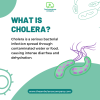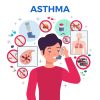Are you experiencing cough which is taking forever to go? It just might be Tuberculosis, you need to look out closely for these symptoms.
Tuberculosis (TB) is a potentially serious infectious disease that mainly affects your lungs. The bacteria that causes tuberculosis “Mycobacterium tuberculosis” is spread from one person to another through tiny droplets released into the air via coughs and sneezes. It mainly affects the lungs, but it can affect any part of the body, including the tummy (abdomen), glands, bones, and nervous system.
In most healthy people, the immune system kills the bacteria and there are no symptoms, sometimes the immune system cannot completely kill the bacteria, but it prevents it from spreading in the body. When the immune system fails to contain the spread of the infection, it spreads into the
lungs or other parts of the body and symptoms will develop within a few weeks or months.
Although tuberculosis is contagious, it’s not easy to catch. You’re much more likely to get tuberculosis from someone you live with or work with than from a stranger.
Symptoms of Tuberculosis;
-A persistent cough that lasts more than 3 weeks, which may be bloody
-Chest pain
-Weight loss
-Night sweats
-Fever
-Loss of appetite
-Fatigue
What to do when you have Tuberculosis;
-See a doctor
-Stay home.
-Do not sleep in a room with other people during the first few weeks of treatment for active tuberculosis.
-Ventilate the room as Tuberculosis germs spread easily in closed spaces where air doesn’t move. Open the windows and use a fan to blow air.
-Wear a face mask that Covers your mouth especially when you are around people, it lessens the risk of transmission.
-Make sure you finish your entire course of medication, When you stop treatment early or skip doses, it becomes deadly, and difficult to treat.
Vaccination for TB;
In countries where tuberculosis is more common or underdeveloped countries like Nigeria, infants are vaccinated with Bacillus Calmette-Guerin (BCG) vaccine immediately after birth so as to prevent severe tuberculosis in children, adults under the age of 35, who are considered to be at risk of catching TB are also vaccinated.
The BCG vaccine is not routinely given to anyone over the age of 35 as there’s no evidence that it works for adults.
Early diagnosis and treatment will prevent the spread.
Get tested if you experience these symptoms or suspect that you have been exposed to TB.
Protect yourself and others.
If you found this information helpful, please share it with your friends and family on Twitter, Instagram, Facebook and even on Whatsapp. Click here to learn more about other emergency preparedness and firstaid care tips.






